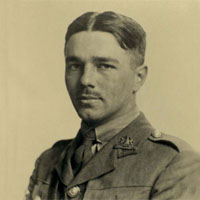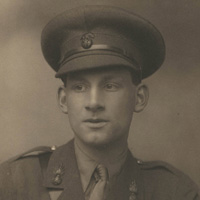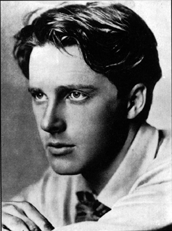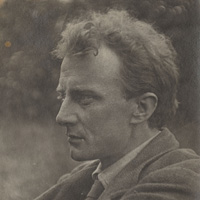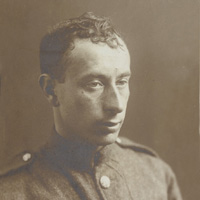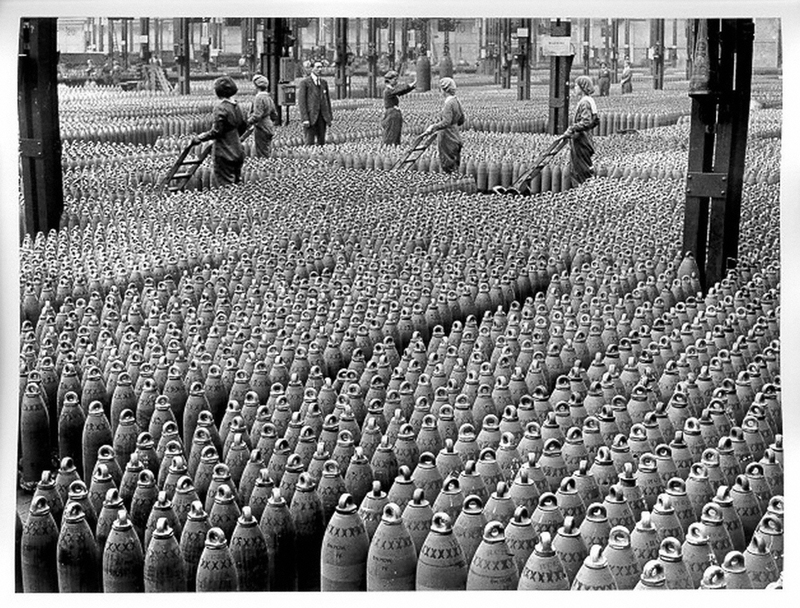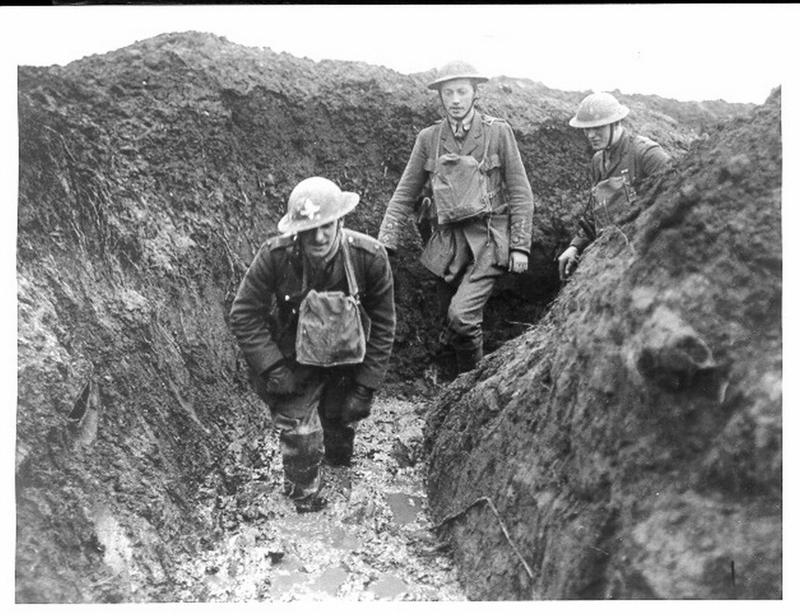Rupert Brooke (1887-1915)
Biography | Analysis of 'III. The Dead' | Brooke's Obituary | More Poems by Brooke
Biography
For one whom Yeats proclaimed "the handsomest young man in England," Rupert Brooke has not aged well. The neo-Romanticism of Brooke and the Georgian Poets was one of the casualties of The Great War. Paul Fussell (in The Great War and Modern Memory, (OUP, 1977)) sees irony as one of the by-products of the First World War, and one of the many ironies of the war is that Rupert Brooke is remembered as a war poet at all, because he is actually not a war poet -- not in the same sense that Siegfried Sassoon, Robert Graves and Wilfred Owen are war poets. Rupert Brooke is rather a pre-war poet. To borrow Blake's contrast, Brooke wrote Songs of Innocence (if not naïveté), while Sassoon and Owen (and others) wrote Songs of Experience.
Brooke's entire reputation as a war poet rests on only 5 "war sonnets" (6 if you count "Treasure" — unnumbered in his short sonnet cycle). Brooke's war experience consisted of one day of limited military action with the Hood Battalion during the evacuation of Antwerp. Consequently, his "war sonnets" swell with sentiments of the most general kind on the themes of maturity, purpose and romantic death -- the kind of sentiments held by many (but not all) young Englishmen at the outbreak of the war. Brooke's "war sonnets" are really more a declaration occasioned by the ups and downs of his tumultuous personal life than a call to war for his generation.
Brooke was already a promising young poet when Britain entered the war the day after his 27th birthday. Unfortunately, the publication of his (pre-) "war sonnets" coincided with his almost mythological (pre-war) death: on Easter Sunday, 1915, Dean Inge read his sonnet "The Soldier" from the pulpit of Saint Paul's; on April 23rd (St. George's Day, the traditional observance of Shakespeare's birth) Brooke died in the Aegean Sea (from blood poisoning) on his way to battle at Gallipoli and was buried on the Island of Skyros. Winston Churchill wrote his obituary for The Times, Lascelles Abercrombie for the Morning Post. As D.H. Lawrence exclaimed: "he was slain by bright Pheobus' shaft . . . it was a real climax of his pose . . . bright Pheobus smote him down. It is all in the saga. O God, O God; it is all too much of a piece: it is like madness."
Brooke was born in 1887 at Rugby where his father was a housemaster. His dominating mother exerted a tremendous influence on him. Brooke traveled in Europe where he prepared a thesis, John Webster and the Elizabethan Drama, which won for him a fellowship at King's College, Cambridge. He roamed across North America and the South Seas for the Westminster Gazette sending back narratives and poems. Brooke was an energetic aesthete skilled at playful, irreverent satire ("Heaven") and not afraid to shock his audience with graphic descriptions ("Channel Crossing").
Biography by: Robert Means, English Literature Librarian, Harold B. Lee Library, Brigham Young University
III. The Dead
Blow out, you bugles, over the rich Dead!
There's none of these so lonely and poor of old,
But, dying, has made us rarer gifts than gold
These laid the world away; poured out the red
Sweet wine of youth; gave up the years to be
Of work and joy, and that unhoped serene,
That men call age; and those who would have been,
Their sons, they gave, their immortality.Blow, bugles, blow! They brought us, for our dearth,
Holiness, lacked so long, and Love, and Pain.
Honour has come back, as a king, to earth,
And paid his subjects with a royal wage;
And Nobleness walks in our ways again;
And we have come into our heritage.
The Works of Rupert Brooke, (Wordsworth Poetry Library, 1994), p. 146
Literary Criticism of 'III. The Dead'
-
'The Dead' (Title)
Winston Churchill wrote a moving obituary on Brooke in The Times, 26 April 1915. -
'Blow out, you bugles' (L.1)
The military emphasis is clear from the beginning, and repeated at the beginning of the second stanza. -
'rich Dead' (L.1)
Money, wealth, and particularly reward are interspersed throughout the poem. The dead are rich not only because of their death, but also in the manner in which they have been allowed to die (L.3 'Dying, has made us rarer gifts than gold'). The personified characters of Holiness, Love, Pain, Honour, and Nobleness rule the earth bestowing the wealth upon their subjects like a medieval lord. -
'These laid the world away' (L.4)
Implying that death is a release from the weariness of the world. -
'gave up the years...their immortality' (Ll.5-8)
Brooke is often criticised for his over- romantic view of the War but here he cleverly interjects the idea that death is not without loss. Not only for the soldiers themselves who have lost their future, but also for their offspring 'who would have been' (L.7) cutting off the immortal line of subsequent generations. -
'to earth' (L.11)
Ironically, the resting place of the dead who have paid such a heavy price for the return of Honour. -
'heritage' (L.14)
A curious term to use, but linking clearly with the overall theme of 'payment and reward'. The word implies 'that which is rightfully theirs', almost as if a legal will has been successfully implemented.
LitCrit Notes by: Dr. Stuart Lee
Rupert Brooke: Obituary
Rupert Brooke is dead. A telegram from the Admiral at Lemnos tells us that this life has closed at the moment when it seemed to have reached its springtime. A voice had become audible, a note had been struck, more true, more thrilling, more able to do justice to the nobility of our youth in arms engaged in this present war, than any other more able to express their thoughts of self-surrender, and with a power to carry comfort to those who watch them so intently from afar. The voice has been swiftly stilled. Only the echoes and the memory remain; but they will linger.
During the last few months of his life, months of preparation in gallant comradeship and open air, the poet-soldier told with all the simple force of genius the sorrow of youth about to die, and the sure triumphant consolations of a sincere and valiant spirit. He expected to die: he was willing to die for the dear England whose beauty and majesty he knew: and he advanced towards the brink in perfect serenity, with absolute conviction of the rightness of his country's cause and a heart devoid of hate for fellow-men.
The thoughts to which he gave expression in the very few incomparable war sonnets which he has left behind will be shared by many thousands of young men moving resolutely and blithely forward in this, the hardest, the cruelest, and the least-rewarded of all the wars that men have fought. They are a whole history and revelation of Rupert Brooke himself. Joyous, fearless, versatile, deeply instructed, with classic symmetry of mind and body, ruled by high undoubting purpose, he was all that one would wish England's noblest sons to be in the days when no sacrifice but the most precious is acceptable, and the most precious is that which is most freely proffered.
Winston Churchill, obituary note in The Times (26 April 1915).
Obituary - Notes
-
The obituary of Rupert Brooke appeared on page 5 of the Monday, April 26, 1915, edition of The Times: "Death of Mr. Rupert Brooke. Sunstroke at Lemnos." The obituary continued: "W.S.C." writes: — "Rupert Brooke is dead&hellip [his] life has closed at the moment when it seemed to have reached its springtime." W.S.C. was, of course, Winston Spencer Churchill. Churchill's portion of the obituary (a eulogy) takes up a little less than half of the total, and is sandwiched between the copy writer's general announcement and later biographical sketch of Brooke. Although, on the surface, it is a tribute to a promising young poet, it's impossible not to sense in Churchill's eulogy an underlying political agenda — especially when considered in the historical context of the Dardanelles campaign which Churchill had helped to conceive and to which he had sent Brooke as part of his own Royal Naval Division (RND).
In September 1914, Churchill offered Brooke a commission in the RND, and within a month sublieutenant Brooke participated in the evacuation of Antwerp. Back in England over the Christmas holidays, Brooke wrote his famous "war sonnets." In February, he joined the Division's Hood Battalion in preparation for the landings at Gallipoli. Passing through Egypt on his way to Gallipoli, Brooke suffered sunstroke and dysentery. Off Lemnos he contracted blood poisoning from an insect bite on his lip and died two days before the landings, on April 23rd — the birthday of Shakespeare and traditional observance of St. George's Day. Churchill cabled his brother John "endeavour if your duties allow, to attend Rupert Brooke's funeral on my behalf. We shall not see his like again."
-
With the Gallipoli landings taking place at that very moment, Churchill was also "comfort[ing] "those who watch[ed] so intently from afar" For one, Prime Minister Asquith whose son Arthur (Oc) was part of the RND. Churchill ends this paragraph: "The voice has been swiftly stilled. Only the echoes and the memory remain; but they will linger." Ironically, Churchill's eulogy would help establish and reinforce the Rupert Brooke myth.
-
Churchill is here referring particularly to Brooke's sonnet V, "The Soldier" (the same sonnet that Dean Inge had read at the pulpit of St. Paul's on Easter Sunday).
-
While Churchill's eulogy helped further the Brooke mystique, his superlatives worked both ways and likewise helped doom Brooke's reputation by overpraising his "war sonnets" and overvaluing his (supposed) selfless example and sacrifice.
-
The Dardanelles campaign finally succumbed to inter-service quarreling and Turkish tenacity, and after a quarter-million casualties, the Allies evacuated the Gallipoli beaches in October of 1915. Churchill tendered his resignation on November 11, 1915 (Armistice Day minus three years). Perhaps the political connection in Churchill's eulogy of Rupert Brooke is merely coincidence&hellip just as it's coincidence that a column appealing for more recruits follows immediately after it.
Notes by: Robert Means, English Literature Librarian, Harold B. Lee Library, Brigham Young University
More of Brooke's Poems: Sonnet Sequence '1914'
Rupert Brooke's sonnet 'The Treasure' was the first in a sonnet sequence entitled '1914'. The five numbered sonnets, preceded by this unnumbered sonnet were first published in the periodical New Numbers (number 4) in January of 1915.
The Treasure
When colour goes home into the eyes,
And lights that shine are shut again,
With dancing girls and sweet bird's cries
Behind the gateways of the brain;
And that no-place which gave them birth, shall close
The rainbow and the rose:-Still may Time hold some golden space
Where I'll unpack that scented store
Of song and flower and sky and face,
And count, and touch, and turn them o'er,
Musing upon them: as a mother, who
Has watched her children all the rich day through,
Sits, quiet-handed, in the fading light,
When children sleep, ere night.August 1914.
The Works of Rupert Brooke, (Wordsworth Poetry Library, 1994)
Rupert Brooke's sonnet 'Peace' was inspired by his experience with the Royal Naval Division during the evacuation of Antwerp in October 1914. Brooke wrote the sonnet later that month, and by the end of the year had written four more to complete a sonnet sequence entitled '1914'. Preceded by an unnumbered sonnet (written in August 1914), the sequence was first published in the periodical New Numbers (number 4) in January 1915.
I. Peace
Now, God be thanked Who has matched us with His hour,
And caught our youth, and wakened us from sleeping,
With hand made sure, clear eye, and sharpened power,
To turn, as swimmers into cleanness leaping,
Glad from a world grown old and cold and weary,
Leave the sick hearts that honour could not move,
And half-men, and their dirty songs and dreary,
And all the little emptiness of love!Oh! we, who have known shame, we have found release there,
Where there's no ill, no grief, but sleep has mending,
Naught broken save this body, lost but breath;
Nothing to shake the laughing heart's long peace there
But only agony, and that has ending;
And the worst friend and enemy is but Death.
The Works of Rupert Brooke, (Wordsworth Poetry Library, 1994), p. 144
Literary Criticism of 'I. Peace'
Brooke observes the sonnet form (14 lines of iambic pentameter, divided into an octave and sestet), however the octave is rhymed after the Shakespearean/Elizabethan (ababcdcd) rhyme scheme, while the sestet follows the Petrarchan/Italian (efgefg). Brooke has also deviated somewhat from the traditional thematic divisions associated with the octave and sestet: question/predicament and resolution/solution, respectively. The octave begins immediately to herald a great change, and the sestet functions merely to detail it further.
Brooke not only bends sonnet rules, he also tacks on an extra syllable to 10 of the 14 lines, while making line 9 (the beginning of the sestet) a full hexameter.
The images in the first four lines: of religious calling, inspired youth, waking with restored strength and refreshed senses, and the swimmer turning (away from filthiness) and diving into sparkling clean water are images of baptism and absolution that belong to the doctrine of "muscular Christianity." Begun and practiced at Rugby where Brooke was born and raised, "muscular Christianity" was a late-Victorian public-school notion of cleansing and test of manhood afforded by getting out of doors and getting in the game. Some practitioners of this notion felt that the war was the way to cleanse society (and especially young manhood) of what they saw as the effeminacy of Modernism. The second quatrain could describe this reaction against Modernism. However, Brooke was also looking for a fresh- start for himself. He was:
Glad from a world grown old and cold and weary,
after frustrated affairs with Katherine Cox and Noel Oliver, and some near and authentic nervous breakdowns, all of which leads Martin Stephen to wonder if "the war may have at last offered certainty and direction to someone [like Brooke] whose capacity to inflict injury on himself outweighed the damage he could do to others." As part of his clean break, Brooke lashed out especially against his former Bloomsbury friends:
Leave the sick hearts that honor could not move,
And half-men, and their dirty songs and dreary,
And all the little emptiness of love!
The end of the octave ("And all the little emptiness of love!") is the climax of the sonnet. But with the first line of the sestet, Brooke comes back to his theme of absolution and reinforces the dual meaning of the poem:
Oh, we who have known shame, we have found release there,
As we've seen before, "there" is both the war (in a very naively generalized way; as an adventure, as a purifying crusade) and Brooke's own state of mind. In the remainder of the poem Brooke resigns himself to the clean simplicity of (what he sees is) a soldier's life and fate — whether a soldier in war or a soldier of life. 'Peace' is a declaration of self- realization and self-determination. It is at once about conversion and autonomy. One of Brooke's biographers, Christopher Hassall, observed that Brooke "celebrated in exultation this discovery of a moral purpose." The poem must be considered in the context of the war as well as Brooke's tempestuous personal life, which at the time of the poem, he was finally beginning to pull together.
Brooke was a product of "muscular Christianity"; a pre- war poet, expressing the pre-war sentiment of cleansing just as poets as diverse as Robert Graves and Isaac Rosenberg wrote poetry in the early days of the war that celebrated this image of the "Happy Warrior." Even Siegfried Sassoon's early poems display this idea of spiritual cleansing afforded by the war, for example his aptly-titled 'Absolution':
The anguish of the earth absolves our eyes
Till beauty shines in all that we can see.
War is our scourge; yet war has made us wise,
And, fighting for our freedom, we are free.
Sassoon later explained: "People used to feel like this when they joined up' in 1914 and 1915. No one feels it when they go out again.'" Brooke never had the chance to become a true trench poet: he died from blood poisoning on April 23, 1915, two days before the Hood Battalion landed at Gallipoli.
In his obituary of Rupert Brooke, Winston Churchill called the sonnets of Brooke's '1914' sequence "incomparable." Such enthusiastic, but premature appraisals of Brooke's work occasioned equally hasty condemnation. Intelligent judgment considers the poem in its historical context. As Paul Fussell has noted about 'Peace', Brooke's sentiment is "an emotion so innocent and bizarre, so confident of right and wrong and secure in its sense of divine intelligence and design, [that it] is not likely to surface more that once a century."
LitCrit by: Robert Means, English Literature Librarian, Harold B. Lee Library, Brigham Young University
II. Safety
Dear! of all happy in the hour, most blest
He who has found our hid security,
Assured in the dark tides of the world at rest,
And heard our word, ' Who is so safe as we?'
We have found safety with all things undying,
The winds, and morning, tears of men and mirth,
The deep night, and birds singing, and clouds flying,
And sleep, and freedom, and the autumnal earth.
We have built a house that is not for Time's throwing.
We have gained a peace unshaken by pain for ever.
War knows no power. Safe shall be my going,
Secretly armed against all death's endeavour;
Safe though all safety's lost; safe where men fall;
And if these poor limbs die, safest of all.
The Works of Rupert Brooke, (Wordsworth Poetry Library, 1994) p. 145
IV. The Dead
These hearts were woven of human joys and cares,
Washed marvellously with sorrow, swift to mirth.
The years had given them kindness. Dawn was theirs,
And sunset, and the colours of the earth.
These had seen movement, and heard music; known
Slumber and waking; loved; gone proudly friended;
Felt the quick stir of wonder; sat alone;
Touched flowers and furs and cheeks. All this is ended.There are waters blown by changing winds to laughter
And lit by the rich skies, all day. And after,
Frost, with a gesture, stays the waves that dance
And wandering loveliness. He leaves a white
Unbroken glory, a gathered radiance,
A width, a shining peace, under the night.
The Works of Rupert Brooke, (Wordsworth Poetry Library, 1994), p. 147
On April 4, 1915, Dean Inge of St. Paul's Cathedral read a sonnet from the pulpit as part of his Easter Sunday sermon. The sermon was published in The Times the next day, and the sonnet therein became, as George Parfitt describes, "an important document of national preparation for war." Originally entitled 'The Recruit', Rupert Brooke's sonnet 'The Soldier' was the last in a sonnet sequence entitled '1914'. The five numbered sonnets, preceded by an unnumbered sonnet were first published in the periodical New Numbers (number 4) in January of 1915.
V. The Soldier
If I should die, think only this of me:
That there's some corner of a foreign field
That is for ever England. There shall be
In that rich earth a richer dust concealed;
A dust whom England bore, shaped, made aware,
Gave, once, her flowers to love, her ways to roam,
A body of England's, breathing English air,
Washed by the rivers, blest by suns of home.And think, this heart, all evil shed away,
A pulse in the eternal mind, no less
Gives somewhere back the thoughts by England given;
Her sights and sounds; dreams happy as her day;
And laughter, learnt of friends; and gentleness,
In hearts at peace, under an English heaven.
The Works of Rupert Brooke, (Wordsworth Poetry Library, 1994), p. 148
Literary Criticism of 'V. The Soldier'
Brooke observes the sonnet form (14 lines of iambic pentameter, divided into an octave and sestet), however the octave is rhymed after the Shakespearean/Elizabethan (ababcdcd) rhyme scheme, while the sestet follows the Petrarchan/Italian (efgefg). Brooke has also deviated somewhat from the traditional thematic divisions associated with the octave and sestet: question/predicament and resolution/solution, respectively. The octave and sestet both enjoin the reader to imagine the blissful state of the fallen soldier.
'The Soldier' is the culmination of Brooke's '1914' sonnet sequence. In 'The Soldier' Brooke invokes the ideas of spiritual cleansing (as found in 'Peace'), inviolable memories of the dead (as in 'Safety'), a hero's immortal legacy ('The Dead' III & IV), but now he combines all these specifically under the overarching framework of English heritage and personal loyalty to it. Although Dean Inge objected to the neo-paganism of Brooke's idea of resurrection,
And think, this heart, all evil shed away,
A pulse in the eternal mind[,]
'The Soldier' touched a nerve and inspired imitations. Some were close and complimentary as they sought a recognizable connection with Brooke's sonnet. For example 'To My Mother — 1916' by Rifleman Donald S. Cox:
If I should fall, grieve not that one so weak
And poor as I
Should die.
Nay! Though thy heart should break
Think only this: that when at dusk they speak
Of sons and brothers of another one,
Then thou canst say—"I too had a son;
He died for England's sake!"
Edward Thomas (who was acquainted with Brooke) was probably musing on 'The Soldier' when he made up his little ditty to a bugle call — 'No One Cares Less than I':
No one cares less than I,
Nobody knows but God,
Whether I am destined to lie
Under a foreign clod,
while Martin Stephen sees a "clear rebuttal" to 'The Soldier' in Charles Hamilton Sorley's sonnet 'When You See Millions of the Mouthless Dead':
When you see millions of the mouthless dead
Across your dreams in pale battalions go,
Say not soft things as other men have said,
That you'll remember. For you need not so.
Associated, as it came to be, with the discredited idealistic attitudes of 1914, Rupert Brooke's sonnet 'The Soldier' suffered a similar fate. However, Stephen finds that "the personal element" in Brooke's sonnets distinquishes them from propaganda verse: "[w]hatever else they may be, Brooke's sonnets sum up admirably a mood that was felt by many people when war broke out."
LitCrit by: Robert Means, English Literature Librarian, Harold B. Lee Library, Brigham Young University
Next:
